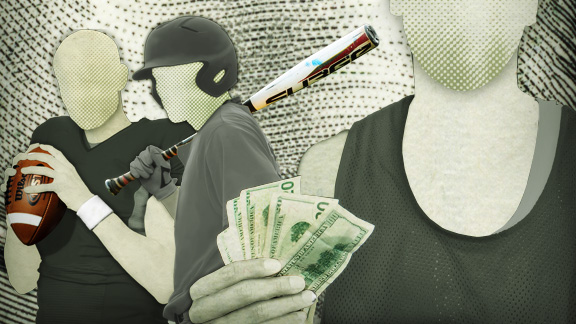Yes, we’re still talking about it. To pay or not to pay, is the question heating up and facing Division I athletic directors across the country. This week a statement was released, making it clear that “pay for play” will not be supported by NCAA athletic directors in their pursuit of improving the collegiate athletic stage. I can’t say I blame them.
I think Iowa State’s Jamie Pollard tweeted it best: “Ask a student body member with thousands of dollars of debt at graduation how they feel about a student-athlete saying they should be paid?” I write this piece as one of those students but also as an adamant fan of collegiate sports. So I’m going to do my best to approach this with a fair perspective – it’s improbable but I’ll try.
I can understand the idea behind paying for play. College athletes, especially football players, bring plenty of revenue to their universities. I’m sure in some indirect way I owe thanks to the football team for University of Oregon’s new journalism school (thank you De’Anthony). Of course, I assumed that’s why in many cases we’re letting them attend school for free (or half price or with a generous discount). Not only that but many athletes – at least at Oregon – receive other benefits as well. Tutors, for instance, are provided with no extra cost, something struggling students pay for out of pocket if they need one on one help. I’m going to assume housing and books are paid for as well and let me tell you, I would kiss the next person who paid for my books (don’t worry dad, I’ll get you at Thanksgiving). On top of that there are other bribes, errrr benefits, to attending schools such as facilities, uniforms, trainers, etc…
Still, after this, there are people saying that athletes deserve compensation. In addressing this I’m going to ignore all the problems of logistics such as Title IX and remembering all those “other sports” outside of football. After all, in the competitive world of collegiate football, schools are attempting to attract the best athletes to reach the top and attract the most viewers/fans. What better way to do this than to throw more money at players?
But the way I see it, if they’re good enough, some day they will make it to the NFL, get paid millions for signing a contract, and will probably have little complaints about the money they didn’t get paid in college. And honestly, most of them won’t make it that far. What is it the commercials say? Over 400,000 student athletes will go pro in something other than sports. At least many will walk away with a free degree and four extra years of playing the sport I’m assuming they’re passionate about. I can think of plenty of college freshmen boys unpacking their bags into their dorm this morning, who would be glad for just one more game under the lights.
Perhaps that’s what bothers me most. Isn’t playing for a school, for a uniform, supposed to be an honor? Talented, NFL bound players will have plenty of time to worry about paychecks and millions. For now, why not take four years to be something of a normal college kid, accept a scholarship, pretend to focus on studies, and play football? It’s hard to believe that athletes are being taken advantage of when you consider the rewards, the glory, and let me add one more time, the free education. Because whether they end up using it or not, being educated is a commodity that lasts longer than speed, skill, and knees.
In the big picture, though, I don’t think the problem is with the NCAA or those in favor of wanting compensation. I think the problem lies with the fact that the NFL doesn’t have a minor league system. Players cannot bypass college to reach the professional level. The NFL gets a free pass by using the college system and not paying talented athletes. It’s a theory but surely they receive the greatest benefits of the current system without sewing any seeds. If people are still passionate about paying for play perhaps the NFL should be footing the bill.
In the end, I doubt we’ll be seeing an NFL minor league in the future. Even without that, I agree the pay for play movement is a step to far. Fans at the collegiate level will continue to watch because it’s their school, their town, or their state. Players will continue to attend schools, take scholarships, and reap benefits outside of monetary compensation because it’s the only path to a professional career. And for those talented players who perhaps do deserve extra pay, I can almost promise they will make it to the NFL and make more money than they could have handled at 19 years old. In the meantime, I’m certain that without pay the play will continue at full force.
Add The Sports Daily to your Google News Feed!
